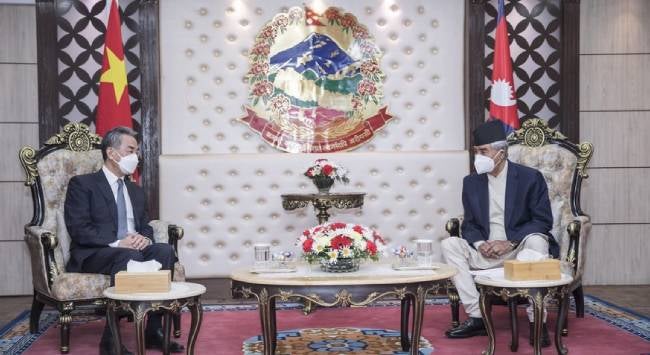Summary
During Chinese Foreign Minister Wang Yi’s visit to Kathmandu, Nepal and China signed and exchanged nine agreements and documents but none of these were related to the Belt and Road Initiative (BRI). Wang Yi’s visit came at a time when Kathmandu had just ratified the American-backed Millennium Challenge Corporation Compact, which many see as a counter to the Beijing-led BRI.
On 25 March 2022, China’s State Councilor and Foreign Minister Wang Yi arrived in Kathmandu as a part of his tour of several South Asian countries. Earlier, in Pakistan, Wang Yi attended the 48th session of the Council of Foreign Ministers of the Organisation of Islamic Corporation as a special guest. After Islamabad, Wang Yi had talks with the Taliban-led administration in Kabul. Thereafter, he landed unannounced in New Delhi where he met with India’s External Affairs Minister S Jaishankar and National Security Advisor Ajit Doval.
Wang Yi’s visit to Nepal was the first by a senior Chinese official since President Xi Jinping’s trip to Kathmandu in October 2019. This was also the first high-level visit after the Nepali parliament ratified the United States (US)-backed Millennium Challenge Corporation (MCC) Compact in late February 2022. Many political observers and geostrategic experts believe that China did not want Nepal to ratify the MCC Compact. Many in China perceive that the MCC Compact is a “geopolitical tool” to “stir up trouble surrounding China”. After the ratification of the MCC Compact, China took note of the Nepali parliamentary decision, along with its “interpretive declaration”.
On 26 March 2022, following the bilateral talks with Nepal’s Foreign Minister Narayan Khadka, the two foreign ministers witnessed the signing and exchanging of a number of agreements and documents. These texts focus on economic and technical cooperation; technical assistance; cooperation on feasibility study; safety and health condition protocol; duty-free treatment; handover certificate for a highway project; protocol on Chinese medical team working in Nepal; and delivery of COVID-19 vaccine to Nepal.
Despite their relatively broad coverage, none of these agreements were related to the Belt and Road Initiative (BRI). Since the signing of the BRI agreement between Kathmandu and Beijing in May 2017, not a single project has taken off in Nepal due to several constraints, including the differences on the finalisation of the text on the project implementation agreement. Nepal insists on Beijing providing grants. Otherwise, Kathmandu wants “soft loan” or “concessional loan” at a minimal interest rate. However, under the BRI, Beijing often offers loans with high interest rates and short payback periods.
Despite their differences on the BRI, Nepal needs China to serve its foreign policy and economic interests. In the last few years, Beijing has spent large amounts of money on building civic infrastructures such as airports, power plants and hospitals, among others, in Nepal. In Kathmandu, Wang Yi handed over the new international airport constructed in Pokhara with US$216 million (S$293.8 million) Chinese loan.
During his meeting with Wang Yi, Nepal Prime Minister Sher Bahadur Deuba congratulated Beijing on successfully hosting the 2022 Winter Olympics and thanked China for providing strong support for Nepal’s economic and social development over the years. Deuba also assured the Chinese foreign minister that Nepal would adhere to the ‘One China’ policy and would not allow any forces to use his country’s territory for any anti-China activities. On the last day of his visit, Wang Yi met with Nepal President Bidya Devi Bhandari. During the meeting, Bhandari conveyed Nepal’s willingness to promote the BRI in the country.
Besides the government officials, Wang Yi had a separate meeting with Nepal’s former prime minister and leader of the opposition, K P Sharma Oli, and Pushpa Kamal Dahal, Chairman of the Communist Party of Nepal-Maoist Centre and a critical coalition partner of the Deuba-led government. Oli appreciated China’s extension of its unreserved support to Nepal to guard its sovereignty, independence and territorial integrity, and for providing assistance to Kathmandu to fight against the COVID-19 pandemic. Dahal expressed his gratitude to China for its support to Nepal and expressed readiness to take forward the important consensus reached by the two countries and accelerate cooperation on the BRI projects relating to connectivity and infrastructures.
Wang Yi’s meetings with relevant and important people in the Nepali government and Nepal’s varying political factions reflected Beijing’s desire to keep a close watch on the political developments within the country. Linking Nepal’s politics with China’s development, Wang Yi stated that China would support Nepal in finding a suitable development path. He also called on all the political parties and party factions to jointly explore a governance model conducive to promoting political stability, economic growth and livelihood of the people.
The visit certainly provided a fillip to Nepal-China relations. The Nepali side provided much assurance to Wang Yi of its support for and alignment with China, and the Chinese side also expressed its support for Nepal’s development. However, the impact and implications of Nepal ratifying the US-backed MCC on relations between the two countries are yet to be seen.
. . . . .
Dr Amit Ranjan is a Research Fellow at the Institute of South Asian Studies (ISAS), an autonomous research institute at the National University of Singapore (NUS). He can be contacted at isasar@nus.edu.sg. The author bears full responsibility for the facts cited and opinions expressed in this paper.
Photo Credit: China News’s Twitter
-
 More From :
More From :
-
 Tags :
Tags :
-
 Download PDF
Download PDF



